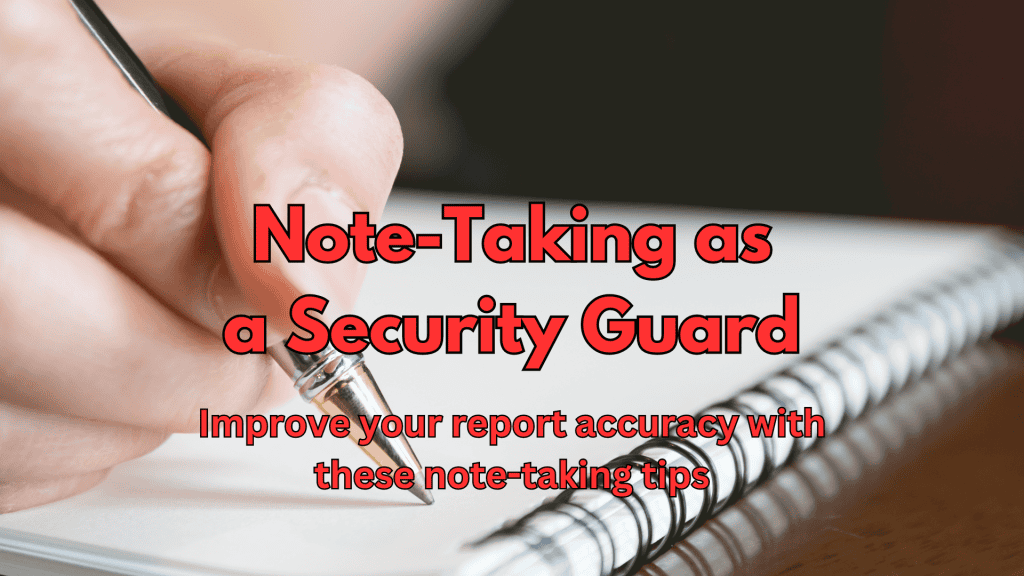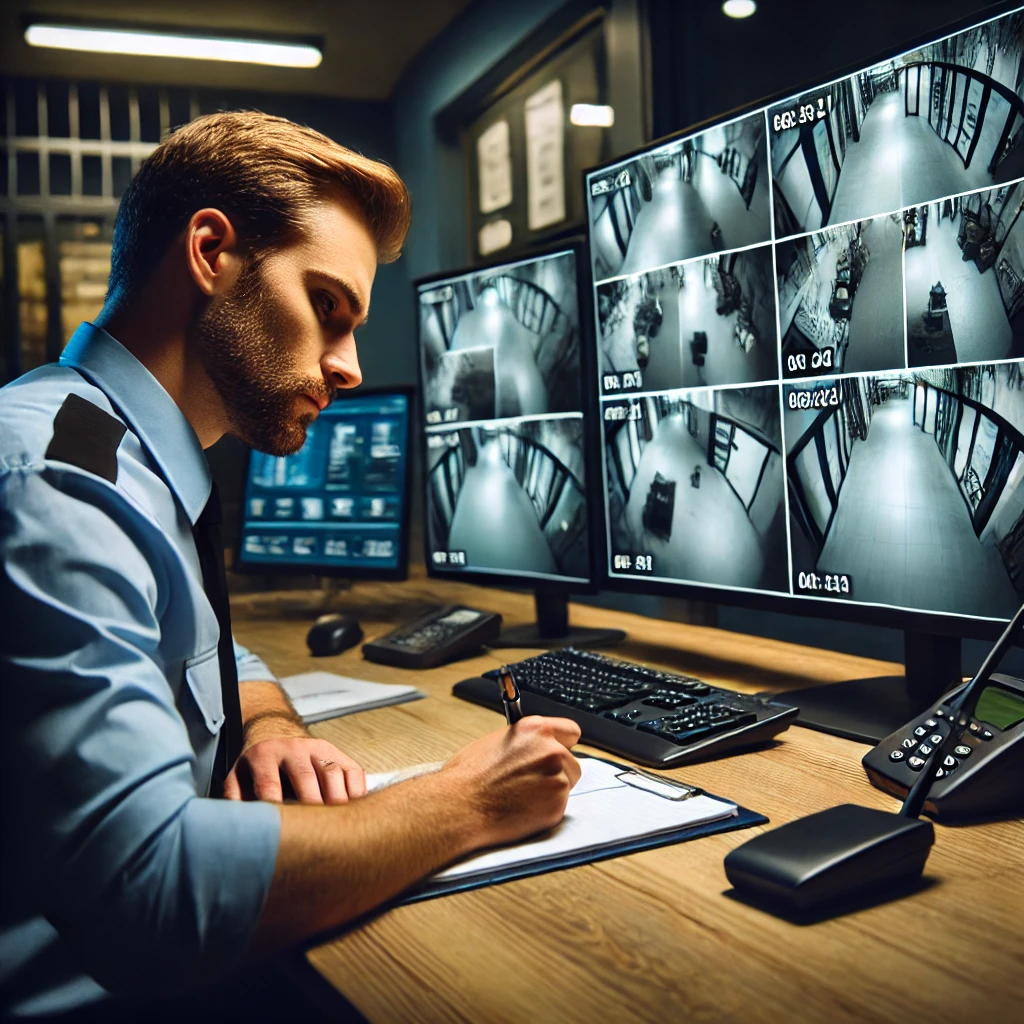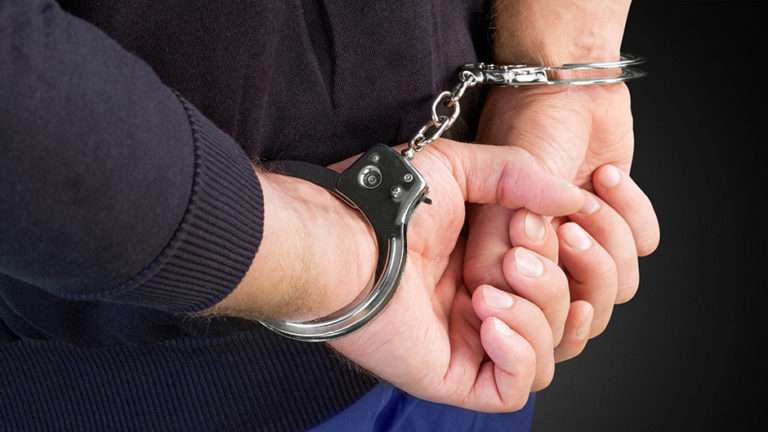Note-Taking as a Security Guard

Taking effective notes is essential for a security guard to perform duties efficiently and ensure safety. As a security professional, your observations and the details you record can be the difference between solving an incident effortlessly or facing challenges later. Accurate note-taking not only serves as a reliable record but also strengthens your ability to respond to incidents swiftly and appropriately.

Your notes create a comprehensive picture of daily activities and incidents that occur on your watch. Whether it’s documenting a routine patrol or a security breach, detailed accounts help identify patterns, manage risks, and provide critical evidence if needed. They are vital to maintain continuity, especially when shifts change, ensuring smooth operations without losing track of important details.
Effective record-keeping builds a foundation of accountability and trust with employers, colleagues, and law enforcement. With clear and precise notes, you enhance collaboration and ensure that the necessary follow-up actions are taken. The ability to provide an accurate account with impactful notes elevates your role from just observing to actively contributing to the security landscape.
The Essential Role of Note-taking for Security Guards
In the role of a security guard, taking notes is crucial for ensuring accountability and maintaining the integrity of daily operations. It acts as a foundation for providing reliable evidence and facilitates effective communication among team members.
Understanding the Basics of Note-taking
As a security guard, developing a systematic approach to note-taking is vital. You should always record details meticulously and consistently. Key details include the date, time, location, persons involved, and specific incidents observed. Using a clear format helps in tracking patterns or irregularities over time.
Organizing your notes can further aid in quick retrieval and analysis. Consider using a structured template or digital tools to enhance accessibility and readability. Maintaining integrity in your notes is essential; always ensure they are accurate and truthful, as they may be used in legal proceedings.
The Importance of Accurate and Timely Notes
Accurate note-taking is a pillar of accountability. Your notes are reliable evidence in investigations and court cases, making precision critical. Avoid embellishments and stick to clear factual information. Timely recording ensures that details are fresh and accurate, reducing the possibility of errors or omissions.
Moreover, timely notes help in effective communication with your team. They provide a detailed account of events that occur during your shift, allowing for continuity in monitoring security threats. Integrating technology like mobile apps can facilitate real-time note-taking, improving the accuracy and efficiency of your reports.
Creating Effectual Security Reports
Crafting precise security reports necessitates attention to detail and a deep understanding of the necessary components. These reports should convey factual information clearly and accurately while addressing all essential elements of any incidents that occur.
Components of a Comprehensive Security Report
A well-rounded security report should include who, what, when, where, why, and how. This provides a full picture of the incident and helps ensure no critical details are overlooked.
Make sure to document the names and contact information of all involved parties. Physical descriptions, dates, times, and the locations should be recorded with precision. Utilize bullet points or tables to ensure clarity when listing significant data, such as evidence or witness statements.
Report Writing Skills for Security Professionals
Good report writing transforms observations into clear and concise documentation. Focus on using simple and direct language; avoid unnecessary jargon that could confuse the reader.
Factual information is vital. Convey what you saw without speculation. Each piece of information should support the narrative and maintain a logical flow. Pay attention to spelling and grammar to uphold professionalism and ensure the report is easy to understand.
Incident Report Essentials
Incident reports are critical in determining the outcome of an incident. Begin with a summary, ensuring the reader understands the context immediately.
Include detailed descriptions of the crime scene and the sequence of events. Emphasize objectivity, keeping personal opinions out of the report. Supporting evidence, such as photographs, diagrams, or other documentation, should be referenced and attached.
By addressing these components, your incident reports will serve as reliable and informative resources for relevant stakeholders.
Operational Standards and Best Practices
Effective note-taking as a security guard requires attention to chronological order, the inclusion of weather and other variables, and ensuring that your accounts are factual and objective. These elements are fundamental for maintaining accuracy and reliability in your documentation.
Chronological Order and Detail Orientation
Maintaining a chronological order in your notes is crucial for reconstructing events accurately. Start each entry with the date and time to ensure clarity. Use precise timings like 1415 (using the 24-hour clock) rather than vague estimates.
Include details such as locations or changes in shifts. Lists or bullet points can be helpful for itemizing sequences of events.
Focusing on detail not only supports chronology but also aids in building a comprehensive narrative for future reference. Accurate detail orientation ensures that if notes are needed for testimony, they are both reliable and trustworthy.
Incorporating Weather Conditions and Other Variables
Recording weather conditions adds essential context to events, especially in cases involving outdoor environments. Weather can affect visibility, and movement, or even contribute to unexpected incidents.
Keep track of temperature, precipitation, or unusual conditions. Any variables specific to locations such as construction activity or special events should also be noted.
Including these factors creates a more complete picture of any situation that arose, helping anyone reviewing your notes understand the environment at that time.
Ensuring Factual and Objective Testimony
Your notes often serve as an official record and can be key components of testimony. Staying factual and objective is essential. Avoid subjective language or assumptions about behaviour or motives.
Describe actions and appearances rather than feelings or thoughts. Separating observed actions from inferred intentions ensures your records are clear and unbiased.
This approach not only improves the quality of your notes but also strengthens their value in legal or official settings. By focusing on facts and objectivity, your documentation will provide a credible basis for any necessary testimony.
Training And Certification for Security Personnel
Training and certification for security personnel are crucial in developing the abilities needed for effective performance. Among these abilities, note-taking and report writing are fundamental, ensuring accurate records and enhanced security operations.
Enhancing Note-taking and Reporting Skills
To refine your skills in note-taking and reporting, many security companies offer specialized training programs and are covered in the mandatory provincial training. These courses focus on critical areas such as accuracy, thoroughness, and clarity in documentation.
Certification often includes modules specifically aimed at strengthening your report-writing skills. You learn how to effectively capture details in real-time during an incident, ensuring your records are comprehensive and precise.
Workshops often emphasize the importance of structured note-taking, breaking down information into logical sections. This approach aids in the quick retrieval and understanding of information, enhancing your efficiency as a security guard.
The Impact of Note-taking on Security Careers
Note-taking is crucial in the field of security, providing a solid foundation for career growth and enhancing relationships within the community. By maintaining accurate and thorough notes, security personnel can ensure success and trust in their roles.
Building Trust Within the Community
Accurate note-taking helps security guards build trust with the community. When you document incidents clearly, it presents a reliable reference for future queries. This record is invaluable for community leaders and law enforcement, highlighting your professionalism and diligence.
Trust is fostered when community members see that you consistently record details with precision. They feel safer knowing that security personnel are vigilant and committed. Precise records can address concerns, facilitate discussions, and provide evidence in dispute resolution, essential for maintaining public confidence.
Advancement Opportunities for Diligent Security Guards
Note-taking not only builds trust but also opens doors for career advancement. Demonstrating proficiency in documentation showcases your attention to detail and dedication. These qualities are often sought after by employers for positions of greater responsibility.
By regularly updating your notes, you stay informed and provide value to your team and supervisors. Career development might include promotions, specialized training, or roles in management. Meticulous notes reflect a proactive approach, a quality that can elevate you in your security career.
Frequently Asked Questions
As a security guard, effective note-taking is crucial to your role. It ensures accurate documentation, helps in legal proceedings, and supports your daily responsibilities.
What should be documented in a security guard's memo book?
You should record details of your shift such as time logs, names of individuals involved in incidents, and descriptions of any unusual or suspicious activity. This information helps maintain a clear, chronological record of events.
What are the legal implications of note-taking for security personnel?
Your notes can be used in court, so they must be accurate and unbiased. It's essential to write objectively and ensure entries are dated and timed, as they can serve as legal evidence. Ensure that your records align with your company's policies.
How can a security guard effectively report an incident?
Start by gathering all relevant details, including who, what, when, where, and why. Be concise yet comprehensive. Use straightforward language to describe the incident clearly. Your report should cover the incident from beginning to end and include any immediate actions taken.
What constitutes a thorough report according to security industry standards?
A thorough report includes all necessary facts without personal opinions. It must be clear, concise, and complete, covering the context, parties involved, actions taken, and outcome. Following industry standards ensures your report is professional and useful for any necessary follow-up.
Why is maintaining a notebook crucial for a guard's daily duties?
Consistent note-keeping helps keep track of daily activities and incidents. It acts as a reliable reference for recalling past events and aids in performance evaluations. It also serves as official documentation, which can support your actions and decisions in case of disputes or questions.
Last Updated on Sep 23, 2024





